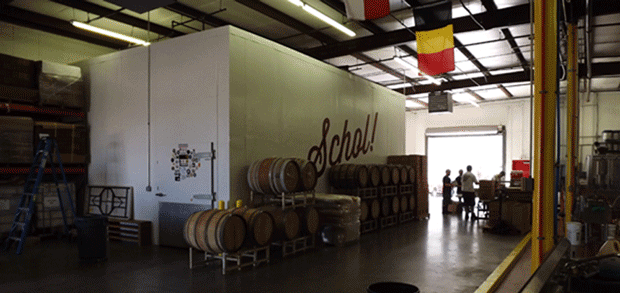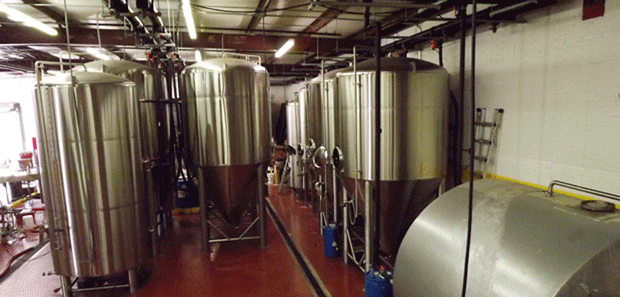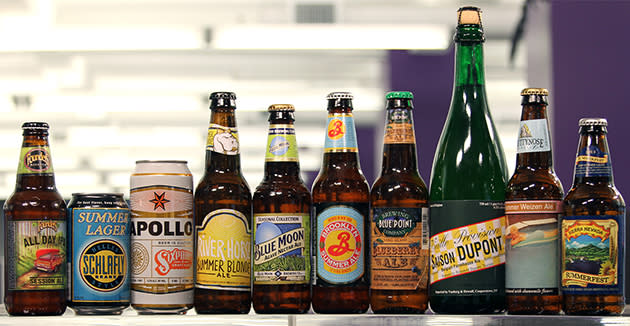In Texas, a Craft Beer Comes by Way of Belgium
When Wim Bens started making beer in his garage a few years ago, he didn't envision that he'd eventually be sitting in a former carpet warehouse discussing the finer points of barley and hops as a businessman-brewer.
Yet here he is, doing exactly that. A native of Belgium whose family brought him to Texas when he was seven years old, Bens left a career in advertising to become a full-time craft-beer maker, and this year his still-young brewery is hoping to complete 4,000 barrels of 31 gallons each.

"It wasn't like I woke up and said, 'Hey. Let's build a brewery.' You just don't do that," Bens says. "There's a lot of steps along the way. It's like eating an elephant. You eat it one bite at a time."
His company, Garland-based Lakewood Brewing Co., is one of more than 2,000 craft brewers now doing business in the United States. Though it's been selling its beer for less than a year, Lakewood is already distributed to around 200 bars and restaurants and some 100 retail carriers, primarily in the Dallas-Fort Worth market. Its roster, which includes the wheat beer Rock Ryder and a stout called The Temptress, features four year-round beers, four seasonals and a number of one-time, limited editions.
Bens, 35, works alongside a staff of 10 employees to finish roughly 300 barrels of beer a month. Most of the titles the brewery started with had their beginnings in his home-brew pastime, back when his goals were simpler: Make good beer that he enjoyed drinking.
"I never thought I'd turn it into a business," he says. But after studying with the American Brewers Guild, going through an apprenticeship at craft brewer Rahr & Sons in Fort Worth, winning some awards and getting a few dedicated backers, Lakewood was up and running — for the beer, Bens stresses, not for the money.
"You don't enter the beer industry to become rich," he says. "You enter it because you're passionate about it. We all try to make a living, but no one's getting rich in craft beer."
Americans like beer
The beer industry, however, is a large, serious business taken as a whole. Data from the industry lobbying group Beer Institute show that, in 2011, American retail beer sales, covering drinks consumed in restaurants and those purchased at stores, amounted to $99 billion.
Craft beers aren't unknown to drafts and coolers, but they do remain a small part of the overall U.S. market. The small brewers trade group Brewers Association estimates that craft brewers sold 13.2 million barrels in 2012, with the retail dollar value totaling about $10.2 billion. That barrel volume, it says, is 6.5% of the U.S. beer market, though the share is expanding. The previous year, slightly under 11.5 million craft barrels were sold.
Still, to put it in perspective, giant brewer Anheuser-Busch InBev (BUD) alone had worldwide revenue of $39.8 billion last year, and SABMiller (SBMRY) had group revenue of $34.5 billion.
Boston Beer (SAM), the maker of Samuel Adams, is one of the best-known craft brewers, with core shipment volume of 2.7 million barrels last year and gross sales of $628.6 million. Being small is key if a brewer still wants to count as a craft, with the upper limit set at 6 million barrels annually. According to the Brewers Association, more than 2,300 craft breweries were in operation for at least part of last year. Of those, about 1,100 were brewpubs, a similar number were classified as microbreweries and another 97 were regional craft breweries.
When Bens started, Texas had plenty of beer drinkers, but not necessarily a lot of brewers — Gambrinus-owned Spoetzl, the seller of Shiner Bock, is one of the better-known makers in the state. The Beer Institute puts per capita beer consumption in 2011 by Texans at 23.6 gallons, or about 251 12-oz. cans a person. (By state, New Hampshire residents consumed the most beer that year, about 31.9 gallons each.)

In Bens's view, the relatively tiny size of the craft industry means there are ample opportunities to convert Americans currently wedded to the big, household names. "If we get 10% of those Miller, Bud [and] Coors drinkers over to craft beer, then you have a pretty sustainable population," he says.
Click to check out 10 craft brewed beers available in the market this summer season.
Euro-Texans
Around Dallas, Lakewood is one of the local outfits that also includes Deep Ellum Brewing and Peticolas Brewing. The growth occurring in the craft beer sector is a good thing, Bens says, and new entrants are more likely to find a support network than cutthroat competitors.
"The industry is very open door. It's not like finance, where there are all these trade secrets," he says. "It's [about] making good beer, and the mentality is that the rising tide raises all ships."
At Lakewood, all the beers have a Belgian, or at least European, influence. Seasonals include a pumpkin-spiced beer called Punkel and a Czech-style pilsner known as Zomer Pils. Because malt and hops don't grow in Texas, those ingredients are imported, sometimes from overseas. Depending on the specific recipe, Bens says he'll use American, British, Belgian or German malt.
The company's Legendary Series comprises the short-run specials. The first was Brabo's Cut, a Belgian-style dark ale. While inventing these new recipes on a somewhat regular basis might not be easy, Bens says forcing himself to stay creative keeps the craft fun. That perhaps makes up for the actual not-to-be-forgotten work part.
"I think people have a very romantic notion of brewing, that the brewer is just stirring the mash with his long paddle," he says. "And he's got a big beard, and there's a soft yellow light coming across the brewery, and he's smelling the hops. The reality is, you're working your a-- off, it's 110 degrees in there, and you're cleaning more than you're doing anything else. That's the reality of the day."

